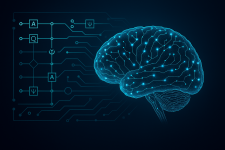In the last decade, Artificial Intelligence (AI) has transitioned from research labs into our daily lives — from voice assistants and personalized ads to predictive healthcare and autonomous vehicles. But now, a new horizon is emerging: the fusion of AI and Quantum Computing.
Quantum computing works on qubits, which unlike classical bits, can represent multiple states simultaneously. This allows quantum machines to perform calculations that would take today’s supercomputers years, in mere seconds.
So what happens when we combine quantum speed with AI intelligence?
1. Faster AI training: Language models like ChatGPT could be trained in hours, not weeks.
2. Advanced simulation: From climate modeling to protein folding, AI could predict outcomes with unprecedented accuracy.
3. Cybersecurity threats: Quantum algorithms could crack traditional encryption, creating both risk and opportunity.
And it doesn’t stop there. Quantum-enhanced AI can empower smarter drug discovery, improved logistics optimization, and faster financial analysis. These breakthroughs could fundamentally shift the way businesses operate, and how humans interact with machines.
Yet, with such power come deep ethical concerns:
1. Can we control hyperintelligent systems?
2. Will developing nations be left behind in the quantum race?
3. Are our education systems preparing us for quantum-era jobs?
4. What safety nets exist if AI becomes too autonomous or uncontrollable?
Policymakers, technologists, and educators must come together to form a governance framework that ensures innovation doesn’t outpace human safety. Conversations around AI alignment, quantum ethics, and digital sovereignty are becoming more relevant than ever.
This is more than a technological leap — it’s a civilization shift. It challenges our current understanding of speed, intelligence, and even creativity.
As AI and quantum computing evolve hand-in-hand, we’re entering an era where imagination meets limitless computation. The question isn’t just “can we build it?” — it’s “should we?” And if yes, how do we stay ahead ethically, economically, and intellectually?
If you’re reading this, you’re already part of this global conversation. Let’s make sure we steer it in the right direction.
Quantum computing works on qubits, which unlike classical bits, can represent multiple states simultaneously. This allows quantum machines to perform calculations that would take today’s supercomputers years, in mere seconds.
So what happens when we combine quantum speed with AI intelligence?
1. Faster AI training: Language models like ChatGPT could be trained in hours, not weeks.
2. Advanced simulation: From climate modeling to protein folding, AI could predict outcomes with unprecedented accuracy.
3. Cybersecurity threats: Quantum algorithms could crack traditional encryption, creating both risk and opportunity.
And it doesn’t stop there. Quantum-enhanced AI can empower smarter drug discovery, improved logistics optimization, and faster financial analysis. These breakthroughs could fundamentally shift the way businesses operate, and how humans interact with machines.
Yet, with such power come deep ethical concerns:
1. Can we control hyperintelligent systems?
2. Will developing nations be left behind in the quantum race?
3. Are our education systems preparing us for quantum-era jobs?
4. What safety nets exist if AI becomes too autonomous or uncontrollable?
Policymakers, technologists, and educators must come together to form a governance framework that ensures innovation doesn’t outpace human safety. Conversations around AI alignment, quantum ethics, and digital sovereignty are becoming more relevant than ever.
This is more than a technological leap — it’s a civilization shift. It challenges our current understanding of speed, intelligence, and even creativity.
As AI and quantum computing evolve hand-in-hand, we’re entering an era where imagination meets limitless computation. The question isn’t just “can we build it?” — it’s “should we?” And if yes, how do we stay ahead ethically, economically, and intellectually?
If you’re reading this, you’re already part of this global conversation. Let’s make sure we steer it in the right direction.

